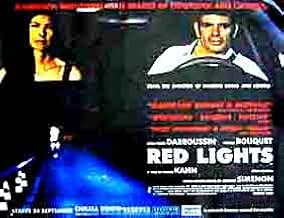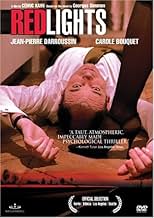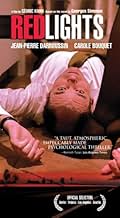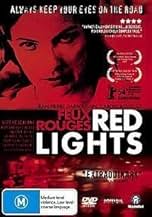IMDb रेटिंग
6.6/10
3.2 हज़ार
आपकी रेटिंग
अपनी भाषा में प्लॉट जोड़ेंA cross-country trip turns out to be a nightmare for a troubled couple.A cross-country trip turns out to be a nightmare for a troubled couple.A cross-country trip turns out to be a nightmare for a troubled couple.
- पुरस्कार
- 2 कुल नामांकन
फ़ीचर्ड समीक्षाएं
8=G=
"Red Lights", a subtitled French film, spends it's 1.75 hour run following Antoine (Darroussin) and his wife Hélène (Bouquet) as they leave Paris for a night drive to Bordeaux to pick up their kids. What should have been an ordinary road trip turns into an extraordinary series of events which will leave the couple forever changed. The less you know about these events prior to viewing the better as any hint of what happens could lead to a case of mistaken genre and spoilage. This film is a human drama which doesn't attempt to entertain with extremes but rather opts to engross with a slowly seductive tale of intrigues kept to realistic proportion. "Red Lights" relies heavily on the ability to identify with the adult married couple and the problems they encounter and, therefor, will play best with mature adult audiences. A nicely managed, methodical and very believable film which spends most of its time with Darroussin, "Red Lights" received good marks from critics and public alike and is well worth a look by mature viewers into French flicks. (B+)
Red Lights is a strange, abstract, almost existential exercise in movie making. Adapted from the 1953 novel by Georges Simenon and set to Debussy's elegantly creepy Nuages, writer-director Cedric Kahn offers up movie with attributes of a Hitchcockian suspense thriller.
The feeling of foreboding begins immediately when we meet Antoine Dunant (Jean-Pierre Darroussin a low-level insurance executive. He's just leaving his job to meet his beautiful wife Hélène (Carole Bouquet) in a local café. They are planning to drive to the countryside from Paris to pick up their kids from summer camp.
But as soon as Antoine gets to the café he guzzles three beers back to back with one eye on the street lest his wife arrive before he's suitably fortified. It soon becomes pretty obvious that their marriage is far from happy - Antoine armed with enough drink to sink an elephant, settles into a manner of truculent impetuosity, while Helene remains detached, cold, and almost abusive.
While in the road, Helen discovers that her husband is utterly plastered. She hardly says anything as he weaves all over the road, but her silence speaks volumes. Thus starts a trip of barely controlled hostility with the husband clenching the wheel and brooding, while the wife fumes beside him. Both are so busy bickering with each other and thinking dark thoughts that they're half oblivious to news reports of an escaped convict on the loose nearby.
Antoine isn't usually a drinker, but something has snapped in him, and as the neon signs of the roadside bars start to beckon him, he becomes obsessed with downing as much cold beer and whisky as he can. He leaves Helene angrily waiting in the car while he goes into yet another bar, to prepare himself for the long night ahead.
Hélène, freaked by his increasing belligerence and inability to drive in a straight line, abandons her husband to look for a train station. Meanwhile Antoine strikes up a conversation with a reserved one-armed stranger (Vincent Deniard).
When, minutes later, the stranger steps out of the parking-lot shadows, his face half hidden by the hood of a sweatshirt, and asks for a ride, the cocky, staggering Antoine doesn't even break stride. By now he's so sweaty and drunk that he waves the fellow right into the car.
What follows is detour into a night of terror for Antoine, Helene, and for the viewer. The movie starts to resemble everyone's nightmare - the inexplicable disappearance of a loved one. And as Antoine embarks on a desperate journey to track his wife down, it soon becomes clear that Red Lights is really showing us a portrait of a marriage, a marriage that has been enigmatically hanging by a thread.
Their need to see the children again is probably just a way of distracting them from the aridness of their relationship. She's beautiful and accomplished, while he plain and dull. Somehow the couple began their marriage as equals, but she soon eclipsed him, for which he can't forgive her. Other than this, Kahn provides very little reason as to why their relationship has suddenly gone sour.
What Kahn does provide, however, is the knowledge that marriage can often dissipate completely, leave two strangers in a car, totally sick of each other, in desperate need of a reviving shock to the system. But when the sun finally rises, and Antoine is released from his drunken hell, Kahn does provide a dash of hope for the couple.
In the end, Red Lights is showing that relationships are frail and that the machinations of marriage are often inexplicable. And if nothing else, Antoine and Helen show that it can all dramatically and irrevocably change and fall apart in a searing flash of red light. Mike Leonard September 05.
The feeling of foreboding begins immediately when we meet Antoine Dunant (Jean-Pierre Darroussin a low-level insurance executive. He's just leaving his job to meet his beautiful wife Hélène (Carole Bouquet) in a local café. They are planning to drive to the countryside from Paris to pick up their kids from summer camp.
But as soon as Antoine gets to the café he guzzles three beers back to back with one eye on the street lest his wife arrive before he's suitably fortified. It soon becomes pretty obvious that their marriage is far from happy - Antoine armed with enough drink to sink an elephant, settles into a manner of truculent impetuosity, while Helene remains detached, cold, and almost abusive.
While in the road, Helen discovers that her husband is utterly plastered. She hardly says anything as he weaves all over the road, but her silence speaks volumes. Thus starts a trip of barely controlled hostility with the husband clenching the wheel and brooding, while the wife fumes beside him. Both are so busy bickering with each other and thinking dark thoughts that they're half oblivious to news reports of an escaped convict on the loose nearby.
Antoine isn't usually a drinker, but something has snapped in him, and as the neon signs of the roadside bars start to beckon him, he becomes obsessed with downing as much cold beer and whisky as he can. He leaves Helene angrily waiting in the car while he goes into yet another bar, to prepare himself for the long night ahead.
Hélène, freaked by his increasing belligerence and inability to drive in a straight line, abandons her husband to look for a train station. Meanwhile Antoine strikes up a conversation with a reserved one-armed stranger (Vincent Deniard).
When, minutes later, the stranger steps out of the parking-lot shadows, his face half hidden by the hood of a sweatshirt, and asks for a ride, the cocky, staggering Antoine doesn't even break stride. By now he's so sweaty and drunk that he waves the fellow right into the car.
What follows is detour into a night of terror for Antoine, Helene, and for the viewer. The movie starts to resemble everyone's nightmare - the inexplicable disappearance of a loved one. And as Antoine embarks on a desperate journey to track his wife down, it soon becomes clear that Red Lights is really showing us a portrait of a marriage, a marriage that has been enigmatically hanging by a thread.
Their need to see the children again is probably just a way of distracting them from the aridness of their relationship. She's beautiful and accomplished, while he plain and dull. Somehow the couple began their marriage as equals, but she soon eclipsed him, for which he can't forgive her. Other than this, Kahn provides very little reason as to why their relationship has suddenly gone sour.
What Kahn does provide, however, is the knowledge that marriage can often dissipate completely, leave two strangers in a car, totally sick of each other, in desperate need of a reviving shock to the system. But when the sun finally rises, and Antoine is released from his drunken hell, Kahn does provide a dash of hope for the couple.
In the end, Red Lights is showing that relationships are frail and that the machinations of marriage are often inexplicable. And if nothing else, Antoine and Helen show that it can all dramatically and irrevocably change and fall apart in a searing flash of red light. Mike Leonard September 05.
Director Cedric Kahn's "Red Lights" alternates between bright day and scary night. Antoine Dunand (Jean-Pierre Darrousin) is an insurance company employee who may enjoy a decent salary but he feels outclassed, and is out-earned I'm sure, by his corporate attorney spouse, Helene (Carole Bouquet). They have a nice, urban apartment and two young kids, a boy and a girl, both at camp eagerly awaiting pickup by their parents.
Antoine feels neglected by Helene, actually hated, and he even half-suspects her time with fellow male employees goes beyond business. He consoles himself with beer and scotch, preferably one after the other. He's clearly becoming, if he isn't already, an alcoholic.
The two leave to pick up their children from a distant camp. It's holiday-making time in France and the highways are jammed. An impatient Antoine, infuriated by the crawl, takes two successive detours, one off the main highway, the other for several refuelings at on-the-way bars. His driving becomes increasingly erratic, his wife's complaints more provocative. Eventually she realizes he's not just driving poorly, he's getting progressively more smashed. An argument ensues interrupting the classical music on their radio. Her anger at his driving is a coda for their growing estrangement. And then a bulletin announces a dangerous criminal has broken prison and is on the loose.
Recognizing that Antoine is really loaded and he won't yield the car keys, Helene runs off while her husband is knocking down scotch, leaving a note that she'll take a train.
Antoine is excessively upset at finding Helene missing-though befogged by booze, he also probably recognizes his own weirdness. Setting off to intercept her train he accepts a morosely quiet hitchhiker (Vincent Deniard), a fellow who offers no name but guess who he really is (hint above).
The film now enters a dark and isolated countryside where Antoine, despite his towering blood alcohol level, becomes justifiably afraid of his mostly silent young passenger.
The ride becomes a trip to terror for Antoine who sobers up enough to know he better master a deteriorating and life-threatening situation. Having done that he hunts for his wife. To tell more would be to spoil an original, well-acted story about fairly ordinary people who have let their marriage grow stale for all the usually mundane reasons that presage a relationship crisis.
The three main characters make "Red Lights," a title that superficially is about Antoine's reckless disregard of traffic signals but actually spotlights the warnings we receive and often ignore about impending personal crises, work. Largely unknown outside of French cinema, all three well-experienced and effective lead actors keep the viewer glued to the screen.
Compared to the current star vehicle hit, "Collateral," "Red Lights" carries forward true, outstanding noir drama by focusing on the straying from safe paths of ordinary people in common situations.
9/10
Antoine feels neglected by Helene, actually hated, and he even half-suspects her time with fellow male employees goes beyond business. He consoles himself with beer and scotch, preferably one after the other. He's clearly becoming, if he isn't already, an alcoholic.
The two leave to pick up their children from a distant camp. It's holiday-making time in France and the highways are jammed. An impatient Antoine, infuriated by the crawl, takes two successive detours, one off the main highway, the other for several refuelings at on-the-way bars. His driving becomes increasingly erratic, his wife's complaints more provocative. Eventually she realizes he's not just driving poorly, he's getting progressively more smashed. An argument ensues interrupting the classical music on their radio. Her anger at his driving is a coda for their growing estrangement. And then a bulletin announces a dangerous criminal has broken prison and is on the loose.
Recognizing that Antoine is really loaded and he won't yield the car keys, Helene runs off while her husband is knocking down scotch, leaving a note that she'll take a train.
Antoine is excessively upset at finding Helene missing-though befogged by booze, he also probably recognizes his own weirdness. Setting off to intercept her train he accepts a morosely quiet hitchhiker (Vincent Deniard), a fellow who offers no name but guess who he really is (hint above).
The film now enters a dark and isolated countryside where Antoine, despite his towering blood alcohol level, becomes justifiably afraid of his mostly silent young passenger.
The ride becomes a trip to terror for Antoine who sobers up enough to know he better master a deteriorating and life-threatening situation. Having done that he hunts for his wife. To tell more would be to spoil an original, well-acted story about fairly ordinary people who have let their marriage grow stale for all the usually mundane reasons that presage a relationship crisis.
The three main characters make "Red Lights," a title that superficially is about Antoine's reckless disregard of traffic signals but actually spotlights the warnings we receive and often ignore about impending personal crises, work. Largely unknown outside of French cinema, all three well-experienced and effective lead actors keep the viewer glued to the screen.
Compared to the current star vehicle hit, "Collateral," "Red Lights" carries forward true, outstanding noir drama by focusing on the straying from safe paths of ordinary people in common situations.
9/10
After "L'ennui", this was the second Cédric-Kahn-movie I have seen, and I found it great. Kahn proves himself a specialist on ridiculous men lacking self-confidence and absolutely inapt to retain some dignity in a modern world like this.
The thriller plot, as stated by some earlier commentators, may be a little weak, especially as regards the "man on the run" (he is obviously taken directly from the Simenon novel but his character is neither fish nor foul). But this is not what it is all about. The thriller plot is merely an excuse to give a touching and disturbing portrayal of character Antoine (and his marriage).
Let me answer to two of the "plot holes" discovered by two other commentators: Antoine's drinking does make sense; he drinks because of frustration and a minority complex for not feeling man enough in the presence of his successful wife. His drinking is a childish act of defiance, he is not a sensible grown-up, not a man (as he keeps repeating himself). And of course, he doesn't recall all these telephone numbers from his memory; as indicated with one of the first calls, he calls directory inquiries and has himself connected to the respective partner each time (remember, there is cuts between the various calls).
Red Lights is a brilliant character study concealed as a masterpiece of suspense. Darroussin gives a touching performance in his role as hero and anti-hero at the same time. He is not particularly likable but still makes us feel sorry for him.
The ending, which I am not going to reveal here, is stirring in a very subtle way because above all it raises the question how it is all going to go on.
I like stories in which weird things happen out of character logic. This is a particular successful one.
The thriller plot, as stated by some earlier commentators, may be a little weak, especially as regards the "man on the run" (he is obviously taken directly from the Simenon novel but his character is neither fish nor foul). But this is not what it is all about. The thriller plot is merely an excuse to give a touching and disturbing portrayal of character Antoine (and his marriage).
Let me answer to two of the "plot holes" discovered by two other commentators: Antoine's drinking does make sense; he drinks because of frustration and a minority complex for not feeling man enough in the presence of his successful wife. His drinking is a childish act of defiance, he is not a sensible grown-up, not a man (as he keeps repeating himself). And of course, he doesn't recall all these telephone numbers from his memory; as indicated with one of the first calls, he calls directory inquiries and has himself connected to the respective partner each time (remember, there is cuts between the various calls).
Red Lights is a brilliant character study concealed as a masterpiece of suspense. Darroussin gives a touching performance in his role as hero and anti-hero at the same time. He is not particularly likable but still makes us feel sorry for him.
The ending, which I am not going to reveal here, is stirring in a very subtle way because above all it raises the question how it is all going to go on.
I like stories in which weird things happen out of character logic. This is a particular successful one.
The first thing to take note in Red Lights is that the story is not rushed: Antoine (Jean-Pierre Darrousin) is perhaps a passive-aggressive, or maybe just having a mid-life crisis. He and his wife Helene are planning for a trip to pick up the kids from summer camp. But the drive hits some things in the way- he has a beer and a whiskey before leaving; a traffic jam gets to Antoine; he drinks again at a roadside; he and his wife bicker; he drinks again; she leaves, and once he realizes he can't catch up with her, he decides to have a night with a little more drinking ahead. While he says he doesn't drink too often ("two, three times a year", he says), this night is different. Especially with a fugitive somewhere out on the loose, as the radio says.
Cedric Kahn is a skilled and trust-worthy director (via France) for a few reasons in dealing with his latest film Red Lights. He doesn't make the pace in the tenser scenes (with a couple of juicy exceptions) really quick cut like in a choppy Hollywood piece. He brings an interesting blend of visuals with the city and the roads, the cars, then as it grows darker outside, the lights outside become key. When Antoine awakes the next morning on the roadside, he's out in the country. As well, he has a great blend of music from Debusy, whom I may have heard before this film but never recognized. It's a fascinating element to add with the impending doom of the film's story. But the key thing that the director can do for a film is the right casting, and here's it's impeccable in dealing with the three leads. Jean-Pierre Darrousin is terrific at conveying the mind-set of this husband in a rocky relationship. Then in the second and third acts, despite what he's doing on the road, he keeps consistent in keeping as the film's reluctant hero. Credit should also be given to first-time actor Vincent Deniard, who is perfect at being the "quiet one you got to watch". And Carole Bouquet is a fair counterpart to a Darrosin.
Although the denouement starts to drag, for my money the film's main chunk doesn't. It would be one thing if Antoine just got drunk. But there's also a good interest in the talking points with the character, as he decides to blow his mind in the process. Red Lights is definitely an art-house film that won't please everyone (the film ends rather realistically, without the kind of extra bit American audiences might want that's more intimate here), but it's still very compelling.
Cedric Kahn is a skilled and trust-worthy director (via France) for a few reasons in dealing with his latest film Red Lights. He doesn't make the pace in the tenser scenes (with a couple of juicy exceptions) really quick cut like in a choppy Hollywood piece. He brings an interesting blend of visuals with the city and the roads, the cars, then as it grows darker outside, the lights outside become key. When Antoine awakes the next morning on the roadside, he's out in the country. As well, he has a great blend of music from Debusy, whom I may have heard before this film but never recognized. It's a fascinating element to add with the impending doom of the film's story. But the key thing that the director can do for a film is the right casting, and here's it's impeccable in dealing with the three leads. Jean-Pierre Darrousin is terrific at conveying the mind-set of this husband in a rocky relationship. Then in the second and third acts, despite what he's doing on the road, he keeps consistent in keeping as the film's reluctant hero. Credit should also be given to first-time actor Vincent Deniard, who is perfect at being the "quiet one you got to watch". And Carole Bouquet is a fair counterpart to a Darrosin.
Although the denouement starts to drag, for my money the film's main chunk doesn't. It would be one thing if Antoine just got drunk. But there's also a good interest in the talking points with the character, as he decides to blow his mind in the process. Red Lights is definitely an art-house film that won't please everyone (the film ends rather realistically, without the kind of extra bit American audiences might want that's more intimate here), but it's still very compelling.
क्या आपको पता है
- गूफ़At the beginning of the movie, the main characters meet at a cafe in the late afternoon. They then go home and get ready to travel to Bordeaux to pick up their kids. On the trip to Bordeaux, they are stuck in heavy traffic. Although it is now early evening, the vertical shadows cast by the cars indicate that the traffic scenes were shot at mid-day.
- कनेक्शनEdited into Le documentaire culturel: Le siècle de Simenon (2014)
- साउंडट्रैकNuages
from "Nocturnes"
Written by Claude Debussy
Performed by Etienne Baudo and LOrchestre de l'Opéra national de Paris
Conducted by Manuel Rosenthal
टॉप पसंद
रेटिंग देने के लिए साइन-इन करें और वैयक्तिकृत सुझावों के लिए वॉचलिस्ट करें
- How long is Red Lights?Alexa द्वारा संचालित
विवरण
- रिलीज़ की तारीख़
- कंट्री ऑफ़ ओरिजिन
- आधिकारिक साइट
- भाषाएं
- इस रूप में भी जाना जाता है
- Red Lights
- फ़िल्माने की जगहें
- Cléré les Pins, फ़्रांस(The garage where Antoine has his tyre changed.)
- उत्पादन कंपनियां
- IMDbPro पर और कंपनी क्रेडिट देखें
बॉक्स ऑफ़िस
- US और कनाडा में सकल
- $6,73,828
- US और कनाडा में पहले सप्ताह में कुल कमाई
- $3,202
- 22 अग॰ 2004
- दुनिया भर में सकल
- $23,94,429
- चलने की अवधि
- 1 घं 45 मि(105 min)
- रंग
- ध्वनि मिश्रण
- पक्ष अनुपात
- 1.85 : 1
इस पेज में योगदान दें
किसी बदलाव का सुझाव दें या अनुपलब्ध कॉन्टेंट जोड़ें






















